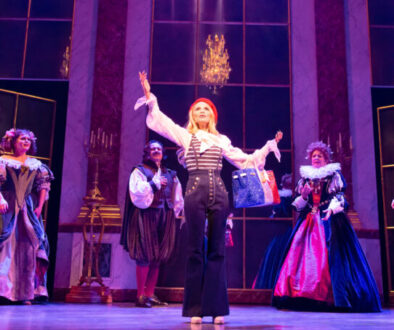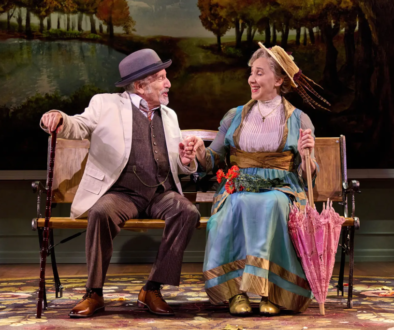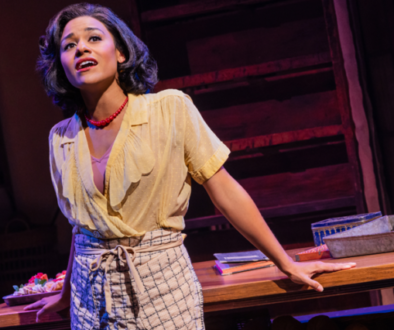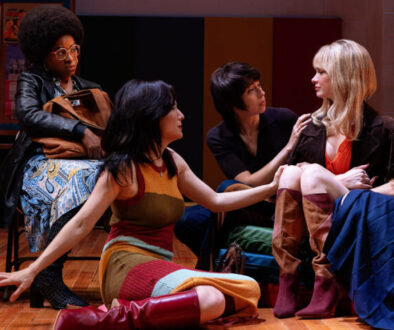By ALAN SMASON, WYES-TV Theatre Critic (“Steppin’ Out”)
When Company by Stephen Sondheim (and a book by Mark Furth) opened on Broadway in 1970 it was such a breath of fresh air and so unlike anything else he or anyone else had done previously that it took a notably short period of time for it to become the gold standard by which he and his contemporaries would be compared.

Sondheim’s stature grew as a result of Company and enabled his later successes with Into the Woods, Follies, Sunday in the Park with George and Sweeney Todd. Of course there were those other shows that followed like Merrily We Roll Along that were thoroughly Sondheim, but which failed to garner the same plaudits from critics and fans. Yet, Company proved that even a Sondheim show with problems was usually lights years better than the best efforts of other theatre creatives.
With approximately 15 songs, he distilled what it was like to be a single man in the Manhattan of his day – post the Free Love era and pre the Feminist Movement era and , unfortunately, the later AIDS epidemic that decimated the gay community.
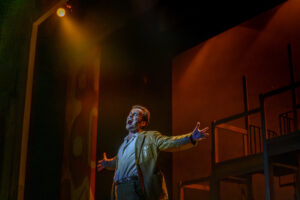
Getting married was an old-fashioned notion and not open to anyone but straight couples, but so many of his friends (including Mary Rodgers) had done it, Sondheim was interested in what it was that kept couples together and what broke them apart.
Being an unattached, solitary figure, he was looking for insights into the institution of marriage. The figure of Robert, played exquisitely by Bogdan Mynka in the current Summer Lyric Theatre at Tulane production, could in a very real sense represent Sondheim, the inquisitive seeker of truth or, given the anecdotal process he employed, what could be discerned as “truthful” to those he interviewed.
His rendition of “Being Alive” is riveting and comes shortly after Wendy Miklovic’s stunning performance of “The Ladies Who Lunch.”
Perhaps, the best example of this is found in “Sorry-Grateful” plaintively sung by Harry (Keith Claverie), David (Joseph Mace) and Larry (Richard Arnold), the longtime married men.
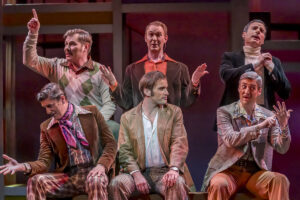
The opening and closing cacophony of “Company” with its telephone chimes emulate the bygone era of the tape answering machine as his many friends call him by a variety of names – Robert, Bobby, Bob, Bobby baby, Robert darling – in order to wish him a happy 35th birthday.
Thirty-five being the midpoint of 70, an age most people would describe as old, was a logical device for the book, as Robert examines his single life and succession of one night stands amidst his married couple friends. The opening number of Act II, “Side by Side by Side/ What Would We Do Without You” is a fast-paced, well-choreographed number that has all the married couples interfacing with Robert in the center.
Larry’s mate Joanne is played by Miklovic, while David’s wife is Jenny (Leslie Claverie). Harry’s wife Sarah is portrayed by Meredith Long, while Peter (Scott Sauber) is joined by his onstage wife Susan (Alix Paige).
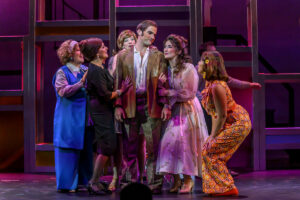
As Paul, John Michael Haas plays opposite his wife-to-be Amy (Meredith Owens). Her comedic turn in “Not Getting Married” is one of the highlights of the musical with Alix Paige added in countermeasure as a singing officiant at the wedding that so terrifies Amy. Owens’ turn as Amy is about as frenetic and controlled as one might anticipate. She clearly owns the role.
Earlier, in “You Could Drive a Person Crazy,” Robert’s three girlfriends – April (Chloe Vallot), Marta (Siddalie Orgeron) and Kathy (Kayla Ceaser) bemoan Robert’s indifference to each of them. If Robert was a representation of a thinly-disguised Stephen Sondheim, then it would be easy to understand why, as a closeted gay man at that time, he would be uneasy to explain the underlying reason for his lack of connection to each of them.
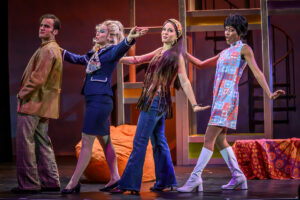
The one time Robert does connect with a woman in a meaningful fashion is with flight attendant June with whom he enjoys a sexual tryst. In “Barcelona” he implores her to stay, hoping she will alter her plans so as to steal away more time. It is a lesson for Robert in being careful for what he wishes.
One of the other fantastic vocal performances in Company is by Orgeron in the solo piece “Another Hundred People.” Her rendition is nothing short of breathtaking and her vocal command is exceptional.
Ceaser has her solo time late in the show during a dance sequence in which she holds the rapt attention of the audience.
The overall direction by Leslie Castay, a Broadway veteran and actor herself, is masterfully handled, while the choreography by Kaitlin Zelon is expertly realized. The minimal set design by Stephen Schepker is striking and keeping in the spirit of the show. The costumes Julie Winn and the wig and makeup designs by Laurin Hart are masterful.
The creative team combo of Daniel Zimmer on lighting and David Rigamer was again inspirational. They continue to do tremendous work in support of Summer Lyric’s ambitious schedule.
As the conductor and music director, Jose Simbulan turns in wonderful renderings of the Jonathan Tunick arrangements that have enchanted Broadway audiences for 55 years. Most of the members of his musical ensemble are present members or veterans of the Louisiana Philharmonic Orchestra and their musicianship shows as a result.
Company continues as part of the Summer Lyric Theatre at Tulane program at Dixon Hall on the Tulane University campus now through tomorrow, Sunday, July 13. Limited tickets are still available here. For more information call 504-865-5269.


